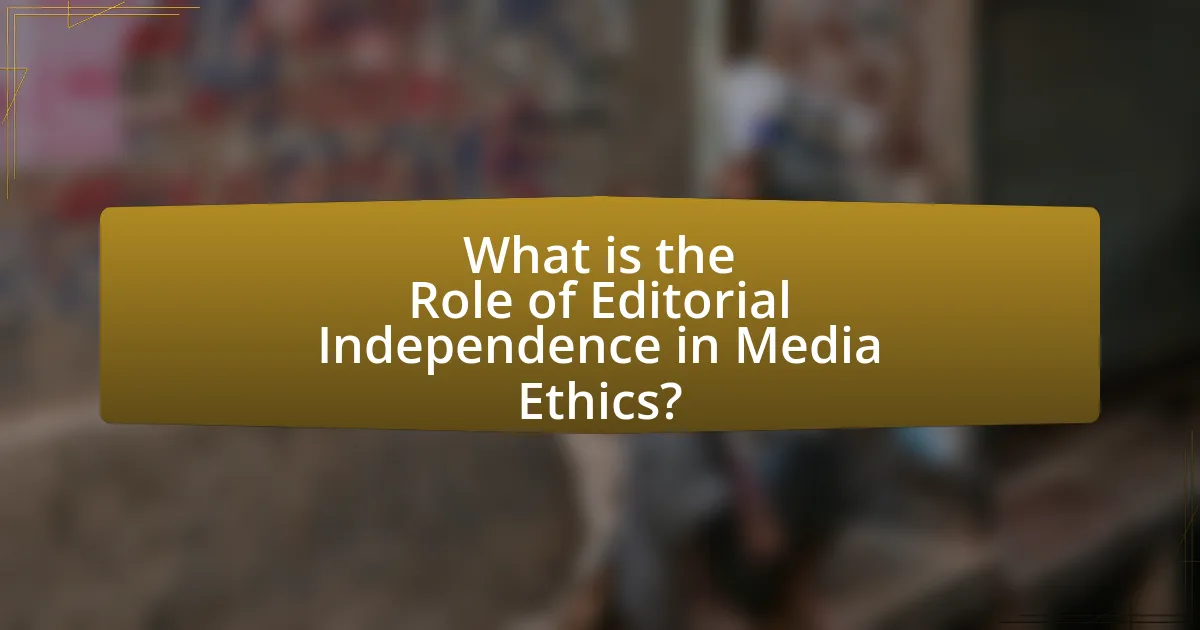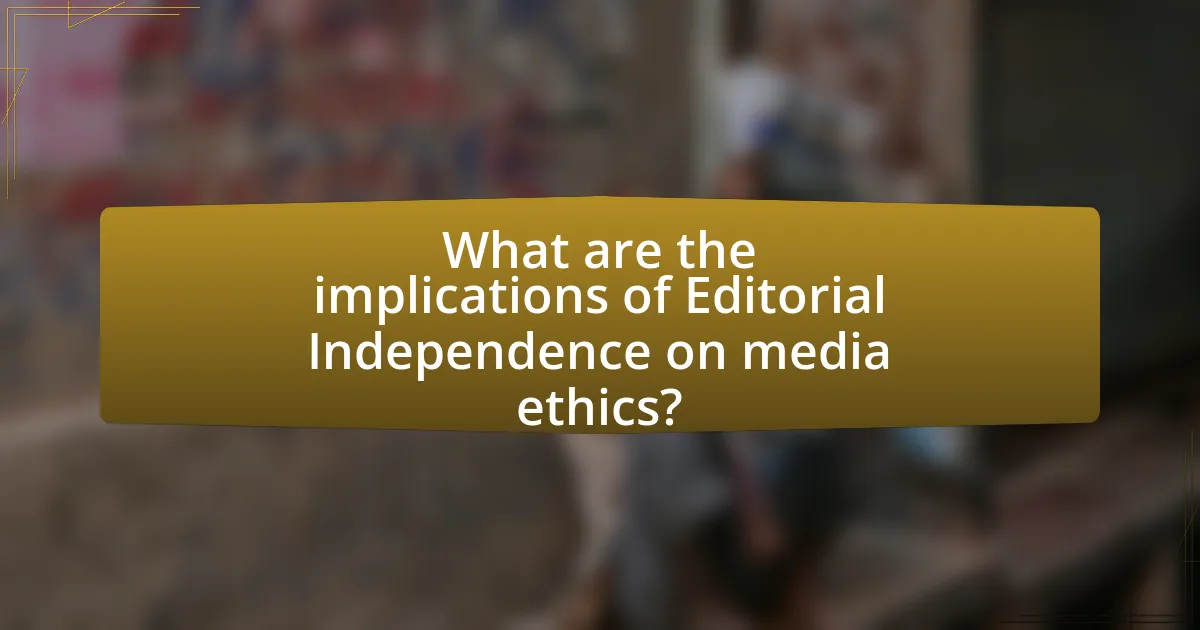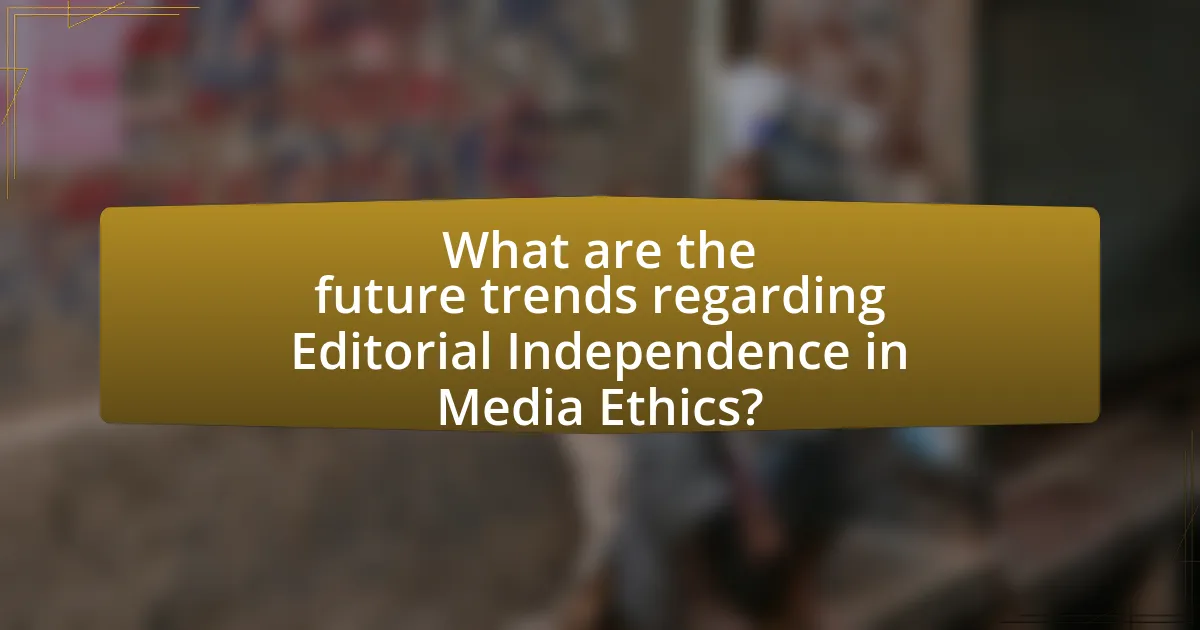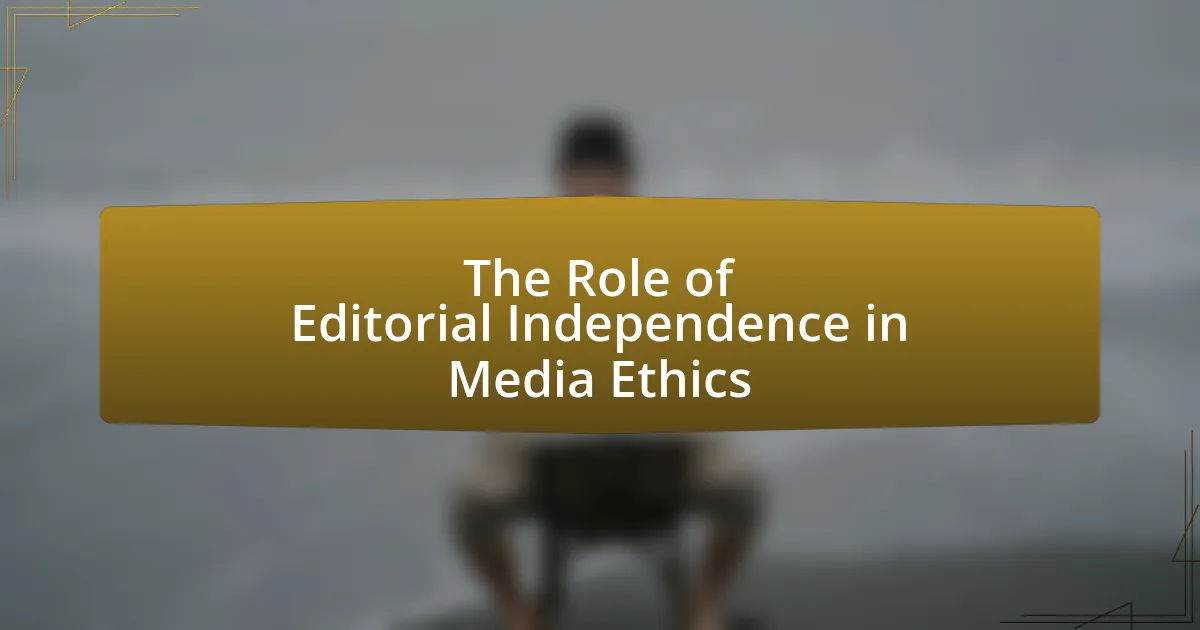The article focuses on the critical role of editorial independence in media ethics, emphasizing its importance for maintaining objectivity and credibility in journalism. It outlines key principles such as autonomy, accountability, and transparency, which are essential for fostering public trust and ensuring unbiased reporting. The discussion includes the impact of ownership structures, financial interests, and political pressures on editorial independence, as well as strategies for media organizations and journalists to safeguard this independence. Additionally, the article explores future trends and the influence of technology on editorial practices, highlighting the need for robust ethical frameworks and educational initiatives to promote journalistic integrity.

What is the Role of Editorial Independence in Media Ethics?
Editorial independence is crucial in media ethics as it ensures that journalists can report news without external pressures or influences, thereby maintaining objectivity and credibility. This independence allows media organizations to serve the public interest by providing accurate and unbiased information. For instance, the Society of Professional Journalists emphasizes that ethical journalism requires independence from those they cover, which helps prevent conflicts of interest and promotes trust in the media. Furthermore, studies have shown that media outlets with strong editorial independence are more likely to produce high-quality journalism that informs and engages the public effectively.
Why is Editorial Independence Important in Media Ethics?
Editorial independence is crucial in media ethics because it ensures that journalists can report news without external pressures or influences, thereby maintaining objectivity and credibility. When editorial independence is upheld, media organizations can provide accurate and unbiased information, which is essential for a well-informed public. Historical examples, such as the Watergate scandal, illustrate how independent journalism can hold power accountable and foster transparency. Furthermore, studies show that audiences trust media outlets more when they perceive them as independent, reinforcing the importance of this principle in ethical journalism.
What are the key principles of Editorial Independence?
The key principles of Editorial Independence include autonomy, accountability, and transparency. Autonomy ensures that editorial decisions are made without external influence from advertisers, government, or other entities, allowing journalists to report freely and accurately. Accountability involves the responsibility of media organizations to uphold ethical standards and provide accurate information, fostering trust with the audience. Transparency requires media outlets to disclose their processes and potential conflicts of interest, enabling the public to understand the context of the information presented. These principles are essential for maintaining credibility and integrity in journalism, as evidenced by the Society of Professional Journalists’ Code of Ethics, which emphasizes the importance of independence in fostering public trust.
How does Editorial Independence influence public trust in media?
Editorial independence significantly enhances public trust in media by ensuring that news coverage is free from external pressures and influences. When media organizations maintain editorial independence, they are more likely to provide unbiased, accurate, and comprehensive reporting, which fosters credibility among audiences. Research conducted by the Reuters Institute for the Study of Journalism indicates that audiences are more likely to trust media outlets that demonstrate a commitment to editorial independence, as it signals a dedication to journalistic integrity and accountability. This trust is crucial, as it influences public perception and engagement with news, ultimately shaping the democratic process and informed citizenship.
How does Editorial Independence manifest in different media organizations?
Editorial independence manifests in different media organizations through various practices that ensure unbiased reporting and editorial decision-making. For instance, in public broadcasting organizations like the BBC, editorial independence is safeguarded by a charter that mandates impartiality and prohibits government interference in content. In contrast, private media companies, such as The New York Times, maintain editorial independence by establishing a clear separation between their news and business operations, allowing journalists to report without commercial pressures influencing their work. Additionally, non-profit media organizations like ProPublica emphasize editorial independence by relying on donations and grants rather than advertising revenue, which helps them focus on investigative journalism without external influence. These practices collectively illustrate how editorial independence is operationalized across different media entities, reinforcing the ethical standards of journalism.
What are the various models of Editorial Independence?
The various models of editorial independence include the institutional model, the professional model, and the market model. The institutional model emphasizes the separation of editorial functions from ownership and management, ensuring that editorial decisions are made without interference from stakeholders. The professional model focuses on the ethical standards and practices upheld by journalists and editors, promoting autonomy based on professional norms. The market model highlights the influence of audience preferences and commercial interests on editorial content, suggesting that independence is shaped by market dynamics. Each model reflects different aspects of how editorial independence is conceptualized and practiced within media organizations.
How do ownership structures affect Editorial Independence?
Ownership structures significantly influence editorial independence by determining the extent to which external interests can shape content and editorial decisions. For instance, media outlets owned by large corporations may prioritize profit-driven agendas, leading to potential conflicts of interest that compromise journalistic integrity. Research indicates that independent media organizations, which are not beholden to corporate or political entities, tend to maintain higher levels of editorial autonomy, allowing for more objective reporting. A study by the Pew Research Center found that 63% of journalists believe that ownership influences news coverage, highlighting the pervasive impact of ownership on editorial freedom.
What challenges does Editorial Independence face in contemporary media?
Editorial independence in contemporary media faces significant challenges primarily due to corporate influence and political pressures. Media organizations often prioritize profit over journalistic integrity, leading to editorial decisions that may align more with corporate interests than with unbiased reporting. For instance, a study by the Pew Research Center in 2021 found that 77% of journalists believe that corporate ownership negatively impacts their ability to report freely. Additionally, political polarization has intensified, with media outlets sometimes catering to specific ideological audiences, further compromising impartiality. This environment creates a landscape where editorial independence is increasingly threatened by external pressures and internal biases.
How do political pressures impact Editorial Independence?
Political pressures significantly undermine editorial independence by influencing content decisions and shaping narratives. When media outlets face pressure from political entities, they may alter their reporting to align with the interests of those in power, leading to biased coverage. For instance, studies have shown that journalists in countries with high political influence often self-censor to avoid repercussions, which compromises the integrity of the news. A notable example is the decline of press freedom in countries like Hungary, where government control over media has led to a reduction in independent journalism, as reported by the Freedom House 2021 report. This demonstrates that political pressures can create an environment where editorial independence is severely restricted, ultimately affecting the quality and reliability of information disseminated to the public.
What role do financial interests play in compromising Editorial Independence?
Financial interests significantly compromise editorial independence by creating conflicts of interest that influence content decisions. When media organizations rely on advertising revenue or sponsorships, they may prioritize the interests of their financial backers over journalistic integrity. For instance, a study by the Pew Research Center found that 63% of journalists believe that financial pressures have a negative impact on their ability to report the news accurately. This reliance on funding can lead to self-censorship, where editors and reporters avoid topics that could alienate advertisers or sponsors, ultimately undermining the objectivity and credibility of the media.
How can media organizations safeguard Editorial Independence?
Media organizations can safeguard editorial independence by establishing clear policies that separate editorial decisions from business interests. This separation ensures that journalists can report without undue influence from advertisers or corporate stakeholders. For instance, the implementation of a firewall between editorial and advertising departments has been shown to protect journalistic integrity, as evidenced by the practices of reputable organizations like The New York Times, which maintains strict guidelines to prevent conflicts of interest. Additionally, fostering a culture of transparency and accountability within the organization reinforces the commitment to editorial independence, allowing journalists to operate freely and ethically.
What best practices can be implemented to ensure Editorial Independence?
To ensure editorial independence, media organizations should implement clear separation between editorial and business operations. This practice prevents conflicts of interest that may arise from commercial pressures influencing content decisions. Establishing a robust editorial policy that outlines the principles of independence and accountability is essential; for instance, the Society of Professional Journalists emphasizes the importance of transparency and ethical standards in journalism. Additionally, fostering a culture that encourages whistleblowing can protect journalists from external pressures, as seen in organizations that have successfully maintained editorial integrity by supporting staff who report unethical practices. Regular training on ethical journalism and the importance of independence further reinforces these standards, ensuring that all staff understand their role in upholding editorial freedom.
How can journalists advocate for their own Editorial Independence?
Journalists can advocate for their own editorial independence by establishing clear ethical guidelines and maintaining transparency in their reporting processes. By adhering to established codes of ethics, such as those from the Society of Professional Journalists, journalists can reinforce their commitment to impartiality and integrity. Furthermore, creating a culture of accountability within their organizations, where editorial decisions are made based on journalistic standards rather than external pressures, strengthens their position. Evidence shows that media organizations with robust editorial policies are more likely to resist censorship and maintain credibility, as seen in studies highlighting the correlation between editorial independence and public trust in journalism.

What are the implications of Editorial Independence on media ethics?
Editorial independence significantly impacts media ethics by ensuring that journalists can report without external pressures or influences. This autonomy fosters trust and credibility, as it allows for unbiased reporting and the pursuit of truth. For instance, the Society of Professional Journalists emphasizes that ethical journalism requires independence from those they cover, which is crucial for maintaining public confidence in media. Furthermore, studies indicate that media organizations with strong editorial independence are more likely to adhere to ethical standards, as they can resist commercial or political pressures that may compromise journalistic integrity.
How does Editorial Independence affect journalistic integrity?
Editorial independence is crucial for maintaining journalistic integrity, as it allows journalists to report news without external pressures or influences. When editorial independence is upheld, journalists can pursue truth and provide unbiased information, which fosters public trust. Research indicates that media organizations with strong editorial independence are less likely to succumb to political or commercial pressures, thereby enhancing the credibility of their reporting. For instance, a study by the Pew Research Center found that 71% of journalists believe that editorial independence is essential for ethical journalism, reinforcing the idea that autonomy in editorial decisions directly correlates with the integrity of the news produced.
What are the consequences of a lack of Editorial Independence?
A lack of editorial independence leads to biased reporting and diminished credibility in media. When editorial decisions are influenced by external pressures, such as political affiliations or corporate interests, the objectivity of news coverage is compromised. This can result in the dissemination of misinformation, as stories may be selectively reported or altered to align with specific agendas. For instance, studies have shown that media outlets lacking independence often reflect the views of their owners or advertisers, which can skew public perception and undermine democratic discourse. Furthermore, the erosion of trust in media institutions occurs when audiences perceive that news is not produced based on journalistic integrity but rather on external influences, ultimately harming the media’s role as a watchdog in society.
How can Editorial Independence enhance accountability in journalism?
Editorial independence enhances accountability in journalism by allowing journalists to report without external pressures or influences, thereby ensuring that their work is based on facts and ethical standards. When journalists operate independently, they can investigate and expose wrongdoing without fear of retaliation or censorship, which fosters a culture of transparency. For instance, studies have shown that media outlets with strong editorial independence are more likely to hold powerful entities accountable, as they prioritize public interest over commercial or political interests. This independence is crucial for maintaining trust with the audience, as it assures them that the information presented is unbiased and reliable.
What role does Editorial Independence play in shaping public discourse?
Editorial independence is crucial in shaping public discourse as it ensures that media outlets can report news and opinions free from external pressures, such as political or corporate influence. This autonomy allows journalists to investigate and present information that reflects diverse viewpoints, fostering informed public debate. For instance, studies have shown that independent media contributes to higher levels of civic engagement and trust in journalism, as audiences perceive unbiased reporting as more credible. Furthermore, the lack of editorial independence can lead to misinformation and a homogenization of viewpoints, undermining democratic processes. Thus, editorial independence directly influences the quality and integrity of public discourse.
How does Editorial Independence contribute to diverse viewpoints in media?
Editorial independence fosters diverse viewpoints in media by allowing journalists and editors to report without external pressures from advertisers, government, or corporate interests. This autonomy enables the exploration of a wide range of perspectives, ensuring that minority voices and alternative narratives are represented. For instance, studies have shown that media outlets with strong editorial independence are more likely to cover underreported issues, such as social justice and environmental concerns, which might be overlooked in more commercially driven contexts. This commitment to impartiality and integrity in reporting enhances the overall richness of public discourse, contributing to a more informed society.
What impact does Editorial Independence have on the quality of information disseminated?
Editorial independence significantly enhances the quality of information disseminated by ensuring that content is free from external pressures and biases. When editorial teams operate independently, they can prioritize accuracy, fairness, and objectivity, leading to more reliable reporting. Studies, such as those conducted by the Pew Research Center, indicate that media outlets with strong editorial independence are more likely to produce investigative journalism and in-depth analysis, which contribute to a well-informed public. Furthermore, independent editorial practices foster trust among audiences, as they perceive the information as credible and not influenced by corporate or political interests. This trust is crucial for maintaining a healthy democratic society, where informed citizens can engage in meaningful discourse.

What are the future trends regarding Editorial Independence in Media Ethics?
Future trends regarding editorial independence in media ethics indicate a growing emphasis on transparency and accountability. As media organizations face increasing scrutiny from audiences and regulatory bodies, there is a trend towards adopting clearer guidelines that delineate the boundaries between editorial content and commercial interests. Research from the Reuters Institute for the Study of Journalism highlights that 63% of journalists believe that maintaining editorial independence is crucial for public trust, suggesting that media outlets will prioritize this aspect to enhance credibility. Additionally, the rise of digital platforms is prompting media organizations to implement more robust ethical frameworks that address issues like misinformation and bias, further reinforcing the importance of editorial independence in maintaining journalistic integrity.
How is technology influencing Editorial Independence?
Technology is influencing editorial independence by enabling greater access to information and diverse viewpoints, while also introducing challenges such as algorithmic bias and misinformation. The rise of digital platforms allows journalists to reach wider audiences and gather information from various sources, enhancing their ability to report independently. However, the same technology can also lead to editorial pressures, as algorithms prioritize sensational content, potentially compromising journalistic integrity. For instance, a study by the Pew Research Center in 2021 found that 64% of Americans believe social media has a negative impact on the news, highlighting concerns about how technology shapes public perception and editorial choices.
What are the implications of social media on Editorial Independence?
Social media significantly impacts editorial independence by creating pressures that can compromise journalistic integrity. The immediacy and virality of social media often lead to a prioritization of sensationalism over factual reporting, as media outlets may feel compelled to cater to audience engagement metrics rather than uphold rigorous editorial standards. For instance, a study by the Pew Research Center found that 62% of journalists believe social media has made it harder to maintain independence due to the influence of audience feedback and the need for clicks. This dynamic can result in self-censorship or biased reporting, undermining the foundational principles of editorial independence in media ethics.
How can emerging technologies support or hinder Editorial Independence?
Emerging technologies can both support and hinder editorial independence by influencing how information is gathered, disseminated, and consumed. On one hand, technologies such as artificial intelligence and data analytics can enhance editorial independence by providing journalists with tools to analyze large datasets, identify trends, and fact-check information efficiently, thereby enabling more informed reporting. For instance, AI-driven platforms can assist in uncovering hidden biases in reporting, promoting a more balanced perspective.
Conversely, emerging technologies can hinder editorial independence through the concentration of media ownership and algorithm-driven content distribution. When a few large tech companies control the platforms where news is shared, they can dictate what content is visible, potentially suppressing diverse viewpoints and editorial voices. Research by the Pew Research Center indicates that 70% of Americans get news from social media, which can lead to echo chambers and limit exposure to varied perspectives, undermining the independence of editorial choices.
What strategies can be adopted to promote Editorial Independence moving forward?
To promote editorial independence moving forward, media organizations should implement clear policies that protect journalists from external pressures. Establishing a robust code of ethics that emphasizes the importance of editorial autonomy can guide decision-making and reinforce the commitment to unbiased reporting. Additionally, providing training programs focused on ethical journalism can empower journalists to resist undue influence from advertisers or political entities. Research indicates that organizations with strong editorial policies experience higher trust levels among audiences, as seen in the 2021 Reuters Institute Digital News Report, which highlights that transparency in editorial processes fosters credibility.
How can educational initiatives foster a culture of Editorial Independence?
Educational initiatives can foster a culture of editorial independence by integrating media literacy and ethical journalism practices into curricula. By teaching students the principles of unbiased reporting and critical thinking, educational programs empower future journalists to prioritize integrity over external pressures. Research indicates that institutions that emphasize these values produce graduates who are more likely to uphold editorial independence in their careers, as seen in studies conducted by the Pew Research Center, which highlight the correlation between educational background and ethical decision-making in journalism.
What role do regulatory frameworks play in protecting Editorial Independence?
Regulatory frameworks play a crucial role in protecting editorial independence by establishing legal standards and guidelines that safeguard journalists from external pressures. These frameworks often include laws that promote freedom of the press, ensuring that media organizations can operate without undue influence from government entities, advertisers, or other stakeholders. For instance, the First Amendment of the U.S. Constitution protects freedom of speech and press, which directly supports editorial independence by prohibiting government censorship. Additionally, regulatory bodies may enforce ethical standards that require transparency and accountability in media practices, further reinforcing the autonomy of editorial decision-making.
What practical steps can journalists take to uphold Editorial Independence?
Journalists can uphold editorial independence by establishing clear boundaries between editorial and business operations. This separation ensures that financial interests do not influence news coverage. Additionally, journalists should adhere to a code of ethics that emphasizes truthfulness, accuracy, and impartiality, which reinforces their commitment to independent reporting. Regular training on ethical standards and the importance of editorial independence can further empower journalists to resist external pressures. Furthermore, creating a transparent process for editorial decision-making can build trust with the audience and stakeholders, thereby enhancing the credibility of the media outlet. These steps collectively contribute to maintaining a robust editorial independence essential for ethical journalism.

Leave a Reply